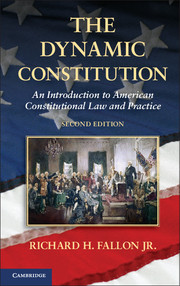Book contents
- Frontmatter
- Contents
- Preface to the Second Edition
- Preface to the First Edition
- Prologue: The Affordable Care Act and Other Vignettes
- Introduction
- Part I Individual Rights under the Constitution
- Part II The Constitutional Separation of Powers
- Part III Further Issues of Constitutional Structure and Individual Rights
- 10 Structural Limits on State Power and Resulting Individual Rights
- 11 The Constitution in War and Emergency
- 12 The Reach of the Constitution and Congress's Enforcement Power
- 13 Conclusion
- Appendix: The Constitution of the United States
- References
11 - The Constitution in War and Emergency
Published online by Cambridge University Press: 05 May 2013
- Frontmatter
- Contents
- Preface to the Second Edition
- Preface to the First Edition
- Prologue: The Affordable Care Act and Other Vignettes
- Introduction
- Part I Individual Rights under the Constitution
- Part II The Constitutional Separation of Powers
- Part III Further Issues of Constitutional Structure and Individual Rights
- 10 Structural Limits on State Power and Resulting Individual Rights
- 11 The Constitution in War and Emergency
- 12 The Reach of the Constitution and Congress's Enforcement Power
- 13 Conclusion
- Appendix: The Constitution of the United States
- References
Summary
[While] the Constitution protects against invasions of individual rights, it is not a suicide pact.
– Kennedy v. Mendoza-Martinez (1963)War is hell.
– General William Tecumseh ShermanON APRIL 12, 1861, CONFEDERATE MILITARY FORCES FIRED on Fort Sumter, in the harbor of Charleston, South Carolina, and within a few days forced the surrender of Union soldiers stationed there. Confronted with the gravest crisis in American history, President Abraham Lincoln knew that he must convene the Congress of the United States – which was then out of session and absent from Washington, not due to return until the fall. But Congress was large, even then, and opinionated and divided. Lincoln therefore thought that he could manage the crisis better alone. So he called Congress into a special session but postponed the meeting date until July 4.
In the period between April 12 and July 4, Lincoln ordered a blockade of Southern ports – a step almost universally regarded as an act of war. Article I of the Constitution assigns the power “[t]o declare War” to Congress, which had not yet convened. Also before July 4, Lincoln called for volunteers for the army and ordered fifteen ships added to the navy, even though the Constitution specifically gives Congress, not the President, the powers to “raise and support Armies” and to “provide and maintain a Navy.”
- Type
- Chapter
- Information
- The Dynamic ConstitutionAn Introduction to American Constitutional Law and Practice, pp. 315 - 334Publisher: Cambridge University PressPrint publication year: 2013



